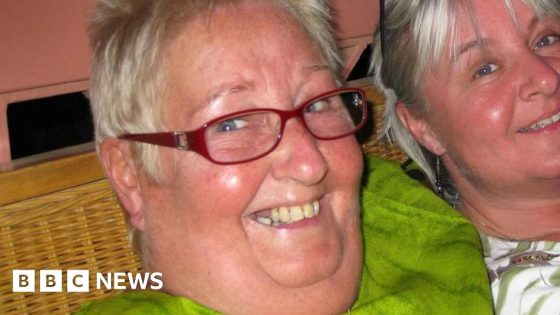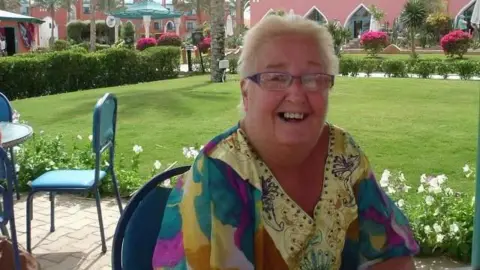 Helen Underhill
Helen UnderhillWhen Jean Frickel fell ill, her family called an ambulance so she could get the crucial life-extending help she needed.
But she died before it arrived. She had waited for 13 hours.
The head of Wales’ ambulance service said the number of hours lost while crews waited to handed over patients had quadrupled since 2018.
One patient in Wales waited 46 hours and 46 minutes – almost two days – for an ambulance after a fall.
Jean’s case is one of 39 across England and Wales over the past two years where coroners have called for changes to the system to prevent these avoidable deaths.
The Welsh government said it had invested more than £180m in improving patient flow and managing people safely in the community.
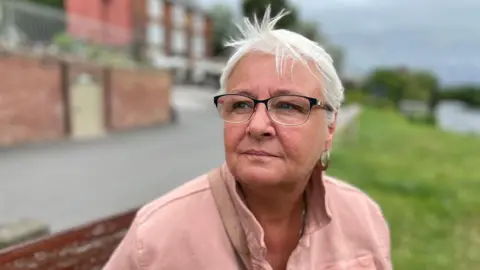
A coroner ruled Jean’s 13-hour wait was because ambulances were queuing to offload patients and unable to answer 999 calls.
Jean’s daughter, Helen Underhill, 62, said: “It’s unforgiveable that an ambulance should be waiting outside hospital for someone to be seen, when somebody else is sitting at home, like my mum, in need.
“It’s not the doctors, it’s not the nurses, it’s not the paramedics. It’s getting the ambulances back on the road.”
She explained her mum, a former retail worker from Buckley, Flintshire, had suffered increasingly poor health after a heart attack at the age of 52, but it prompted her to live life to the full for the next 20 years.
“I knew that the time my mum had was limited,” said Ms Underhill, who lives in Stourport-on-Severn, West Midlands.
“So you grasp at every hour and keep them for as long as you can.”
On the night that Jean died, the Welsh Ambulance Service was in the middle of its busiest period to date, but the issue is felt across Wales, as well as England.
“It just leaves you feeling, what is going to happen if I get ill?” said Helen. “If I need somebody to be there instantly, I dread it.”
In analysis of prevention of future death reports issued by coroners, BBC Wales found one coroner in north Wales said he had raised these issues in March 2013 and the problem had become “significantly worse rather than better” in the past 10 years.
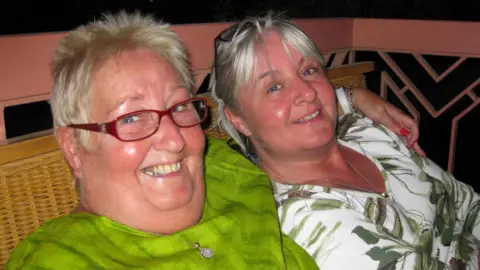 Helen Underhill
Helen UnderhillOf the 39 reports issued since 2022 the longest wait in Wales was 34 hours, which included a wait for the ambulance to arrive, and an additional wait outside hospital.
In England this was 16 hours.
Jason Killens, chief executive of the Welsh Ambulance Services University NHS Trust, said avoidable harm was happening “every day” because of pressure on the system.
He said it had left him feeling “deeply frustrated, concerned and sad”.
“In 2018 when I joined the services here in Wales, we were losing about 6,000 hours a month to delays in handing over to emergency departments,” he said.
“Now, in June just gone, that’s just over 22,000 – 10% up on last year, and four times what we were seeing six years ago. It’s a significant problem for us.”
He said even the 400-plus additional staff, funded by Welsh government, were not enough to meet the growing demand.
“The answer is not hundreds more paramedics and hundreds more ambulances, because what we will do is continue to convey patients to emergency departments to join queues, which will get bigger.”
He said clinical advisers had been added to the contact centres, to give advice and triage calls, as well as advanced paramedic practitioners to treat more patients at home.
“We’re seeing examples across Wales where there is a recognition of the risk which we’re carrying on behalf of the system – but these are NHS patients, not ambulance service patients.”
The Welsh government said while handovers were the responsibility of health boards, more than £180m in additional funds had been invested this year, .
It said this was “to help safely manage more people in the community, avoid ambulance transport and admission to hospital, and work with social care services to improve patient flow through hospitals”.
How long are ambulances waiting outside hospitals?
Monthly performance data in June showed nearly 21,900 hours were “lost” to handover delays by ambulances waiting more than 15 minutes outside major A&Es in Wales.
A freedom of information request said more than 2,000 ambulances waited more than four hours outside major A&E units in May alone.
While 45% of Welsh ambulances are taking an hour or more to hand over a patient at major emergency unit, compared with 10% in England.
Lucille Strachan, 79 and her husband Dave had been married 52 years when he died in March 2022, at the age of 76, of a heart attack.
The retired engineer woke just after 23:00 with chest pains and difficulty breathing, but Lucille was told it would be a four hour wait for an ambulance to their home in Llangollen, Denbighshire.
“We just waited and waited,” said Lucille. “I didn’t realise he was dying – that was the hardest thing.”
 Lucille Strachan
Lucille StrachanLucille and Dave waited nine hours and 52 minutes, but she was told by a consultant at his inquest that if they’d had a response within 120 minutes “he’d probably be alive today”.
An ambulance even arrived on their driveway, but was diverted away to a more urgent call.
“I’ve got nothing but praise for the staff at Glan Clwyd [hospital], and for those poor ambulance staff, because they must have felt awful arriving and seeing how bad he was,” she said.
In response to the coroner, in April this year, the health board said at the time of Dave’s death, a third of its beds were occupied by those awaiting discharge.
Dr James Risley, deputy executive medical director at Betsi Cadwaladr health board, said a range of things were being done to try and improve the situation, including support at home for those prone to falls or breathing problems, as well as senior clinicians reviewing patients waiting in ambulances.
“While we are seeing improvement in reducing the pressure on our emergency departments, we accept there is much more to do as handover delays remain unacceptably high,” he said.
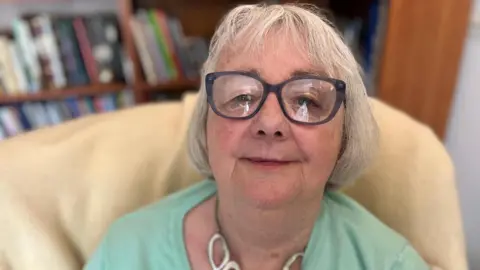
Aside from the impact on patients, Mr Killens said he was acutely aware of the impact on staff.
“There is an impact emotionally for our people and they carry that with them – that plays out for us in higher absence rates.
“Our people also lose their skills because they are with one or two patients a shift instead of eight, 10 or 12.”
Source Agencies

